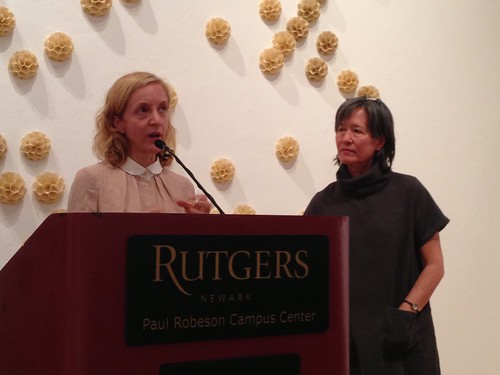 |
| Cynthia Cruz and Ruth Ozeki |
Below is my introduction, and here is a link to upcoming Rutgers-Newark MFA readings. Please do attend if you can!
INTRODUCTION FOR CYNTHIA CRUZ
Broken, remade: out of the wrack of experience, of language, from life's and the imagination's wrecks and ruins, Cynthia Cruz crafts--poems, moments of lyric intensity so sharp they pierce you, like a necklace of thorns, like a hypodermic needle, like an apperception flooding into your consciousness and overwhelming it such that you will not easily see the same way again. These poems do not say: life is beautiful. They do not say: Life is easy. They do not say: Life is what you want it to to be or what make of it. These poems, in their accounting for anomie, for loss, for death, for the living that can be a kind of dying and the fast steep slope downwards into the recognition of our human limits do say: it is rarely easy to make something beautiful out of what you have lived, what you have imagined, but here is how you might do it.
In Cynthia Cruz's poetry there is a rhyming, of form, condensed to its essence like diamonds, and content, the saying what has to be said and could not be expressed any other way, producing a semantic and aural surplus. Less here is always more:
His hands were moving like the twin engines But his lips unzipped my pants. He told me, in a voice of cold pennies, You're the prettiest boy I've ever seen. In a wasted field of spirit-weed, a few miles Off the interstate, a lost trucker gentled me With his slow song of longing. -- "Traveling Gospel," from Ruin
There is no decoration here, no trying to figure out what to do with evident gifts, but a great deal of music, coruscating, indelible, the imagery and rhetoric consonant with a capacity for imagining and inhabiting, as fully and poetically as possible, other selves, including ones that only language itself can summon. One you have read their prophesies, as in her series of poems in The Glimmering Room called "Strange Gospels," you might not be so sure where you really going or what will come.
The poems say: this is what poetry can do. These poems say: you may want to look away but you cannot, and the knowledge you gain may not save your life but it will make you look and think. These poems say: if you have such a powerful tool as poetry this is one way to use it.
Sun leaking through The open screen like a planet, seething. They say the first five years define you. The first five years are missing from my memory. -- "Strange Gospels," from The Glimmering Room
Cynthia Cruz was born in Germany and raised in Northern California. She is the author of Ruin (Alice James Books), and The Glimmering Room (Four Way Books). She has received fellowships from Yaddo and the MacDowell Colony, as well as a Hodder Fellowship from Princeton University. Her poems have been published in The American Poetry Review, Boston Review, Kenyon Review, The New Yorker, The Paris Review, and other periodicals. She lives in Brooklyn.
And a poem by Cynthia Cruz:
NEW YORK STATE (2)
Pharmaceutica Fantastica, wild
What the mind will do
When memory's delicate template
Has been removed.
Substandard State
Hospital corridors, liquid like
Rubber cement inhaled
By children. Sweet
Sister of the biosphere
Called Nurse Station
Hands out meds
And Halloween candy.
We stand in the Tundra of
Lockdown
Waiting for our lives
Never to begin.
Copyright © Cynthia Cruz, from The Glimmering Room, New York: Four Way Books, 2012, p. 46. All rights reserved.









No comments:
Post a Comment